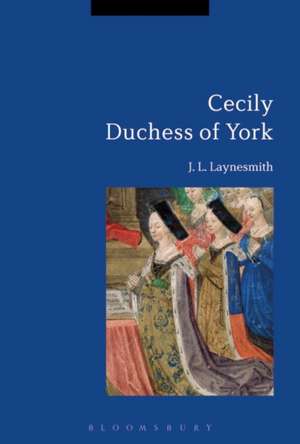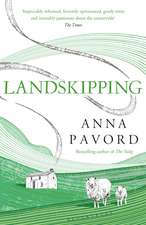Cecily Duchess of York
Autor Dr. J. L. Laynesmithen Limba Engleză Hardback – 12 iul 2017
| Toate formatele și edițiile | Preț | Express |
|---|---|---|
| Paperback (1) | 232.07 lei 6-8 săpt. | |
| Bloomsbury Publishing – 23 ian 2019 | 232.07 lei 6-8 săpt. | |
| Hardback (1) | 774.77 lei 6-8 săpt. | |
| Bloomsbury Publishing – 12 iul 2017 | 774.77 lei 6-8 săpt. |
Preț: 774.77 lei
Preț vechi: 1113.50 lei
-30% Nou
Puncte Express: 1162
Preț estimativ în valută:
148.27€ • 160.100$ • 124.55£
148.27€ • 160.100$ • 124.55£
Carte tipărită la comandă
Livrare economică 23 aprilie-07 mai
Preluare comenzi: 021 569.72.76
Specificații
ISBN-13: 9781474272254
ISBN-10: 1474272258
Pagini: 288
Ilustrații: 10 bw illus
Dimensiuni: 156 x 234 x 24 mm
Greutate: 0.58 kg
Editura: Bloomsbury Publishing
Colecția Bloomsbury Academic
Locul publicării:London, United Kingdom
ISBN-10: 1474272258
Pagini: 288
Ilustrații: 10 bw illus
Dimensiuni: 156 x 234 x 24 mm
Greutate: 0.58 kg
Editura: Bloomsbury Publishing
Colecția Bloomsbury Academic
Locul publicării:London, United Kingdom
Caracteristici
Provides a well rounded portrait of Cecily, drawing on a wide range of sources including her letters, household and estate records and records of those who worked for her
Notă biografică
J. L. Laynesmith is Visiting Research Fellow at the University of Reading, UK. She is the author of The Last Medieval Queens: English Queenship, 1445-1503 (2004), joint winner of the Longman-History Today Book of the Year Award 2005.
Cuprins
List of IllustrationsAcknowledgementsAuthor's NoteList of AbbreviationsGenealogiesIntroduction1. Daughter of Lancaster: 1415-14252. Becoming a Duchess: 1425-14383. Motherhood Begins: 1439-14494. The Wheel of Fortune: 1449-14595. A Paper Crown: 1459-14606. Her First Year of Widowhood: 14617. The King's Mother: 1461-14648. Wife of the Rightful Inheritor: 1464-14719. Queen of Right: 1471-147810. The End of the House of York: 1478-148511. The Queen's Grandmother: 1485-1495ConclusionSelect BibliographyIndex
Recenzii
A substantial bibliography and the use of wide-ranging primary evidence demonstrates the book's grounding in solid research and excellent scholarship. Laynesmith writes in a very engaging style, which makes the material lively and beguiling . [A] well-crafted work that does much to counter the neglect of an important individual who has for too long languished in the historical shadows of her male kin. It is a welcome addition both to the relatively sparsely populated historiography of Cecily Neville and to studies of medieval noblewomen in general.
[A] a richly detailed book . Laynesmith's qualities as a scholar are evident on every page . [A] comprehensive and meticulous study of one woman's exercise of power within the limits of medieval gender expectations and will serve as the standard account of Cecily Neville.
Compellingly written and convincingly argued, Laynesmith's work will have wide-reaching appeal for general readers and scholars of late medieval England alike ... this is a wonderful and accessible book, which will not only appeal to those interested in the lives of late medieval women, but also to those looking to gain a fresh perspective on the general workings and structures of fifteenth-century England.
For many years this new and so far unique biography of Cecily of York will remain definitive. It's scholarship is impeccable and its style very readable.
An outstanding picture of one of the most important figures, male or female, during the fifteenth century ... It may be a term deprived of meaning by overuse, but Joanna Laynesmith has set a benchmark with this work, not only in the study of Cecily Neville, but in the study of medieval women more generally. It is a benchmark I can't see being reached by many.
Laynesmith (visiting fellow, Univ. of Reading) continues her work on late medieval English queens with a study of the life and times of Cecily Neville, mother of two kings, grandmother of the first Tudor queen, and wife of one of the most politically ambitious nobles of the 15th century. Given the scarcity of sources that reveal the personal side of medieval lives, this work focuses more on the social and cultural context of elite women, a strategy that provides a rich context for Cecily's actions. A political survivor and active "good lady" to a wide network of relations and retainers, Cecily has been most recently studied as the model for lay pious behavior. Without denying the sincerity of Cecily's piety, Laynesmith reveals her subject's considerable influence in royal politics, patronage, and administration. Sources unfortunately do not settle questions about her younger sons' startling behaviors (Clarence's rebellion and execution, and Gloucester's treatment of his royal nephews during his usurpation of the throne), but Cecily remained supportive of all her children to her dying day. As wife and mother, widow and grandmother, noblewomen like Cecily linked and managed the complex family politics that characterized the period. Summing Up: Recommended. All levels/libraries.
Laynesmith has been able to present Cecily, duchess of York as a woman with a personality and voice of her own. This is partly due to the lucky survival of source material, but it is also helped by the author's excellent use of that material and her engaging writing style ... this book is a must for anyone interested in the national and local politics of the Wars of the Roses, the role of women in the fifteenth century, aristocratic households, and literary and religious patronage. It will be the definitive biography of the duchess for many years to come.
An important study assessing Cecily in her own right rather than just as a wife, mother and grandmother of royal claimants, kings and queens. Her multifaceted role as a political player, important landowner, a woman of ostentatious piety and the matriarch of the house of York is explored in a judicious, nuanced and accessible way.
This is a welcome appreciation of a neglected, yet central figure in the history of fifteenth-century England; a power behind the throne, but also an important and interesting figure in her own right. In restoring Cecily Neville to her rightful place, Joanna Laynesmith has produced a book that is both scholarly and a pleasure to read, and that will surely appeal to a broad readership.
J. L. Laynesmith's remarkable biographical study shows the duchess as a formidable player in fifteenth-century English political life. She also interrogates the way in which Cecily's career has been portrayed over time, and this historiographical focus will make it useful far beyond the medieval history/women's history classroom. Rarely do we have the source material to present a medieval woman as a fully-fleshed out human being, which is what Laynesmith has accomplished in this work.
[A] a richly detailed book . Laynesmith's qualities as a scholar are evident on every page . [A] comprehensive and meticulous study of one woman's exercise of power within the limits of medieval gender expectations and will serve as the standard account of Cecily Neville.
Compellingly written and convincingly argued, Laynesmith's work will have wide-reaching appeal for general readers and scholars of late medieval England alike ... this is a wonderful and accessible book, which will not only appeal to those interested in the lives of late medieval women, but also to those looking to gain a fresh perspective on the general workings and structures of fifteenth-century England.
For many years this new and so far unique biography of Cecily of York will remain definitive. It's scholarship is impeccable and its style very readable.
An outstanding picture of one of the most important figures, male or female, during the fifteenth century ... It may be a term deprived of meaning by overuse, but Joanna Laynesmith has set a benchmark with this work, not only in the study of Cecily Neville, but in the study of medieval women more generally. It is a benchmark I can't see being reached by many.
Laynesmith (visiting fellow, Univ. of Reading) continues her work on late medieval English queens with a study of the life and times of Cecily Neville, mother of two kings, grandmother of the first Tudor queen, and wife of one of the most politically ambitious nobles of the 15th century. Given the scarcity of sources that reveal the personal side of medieval lives, this work focuses more on the social and cultural context of elite women, a strategy that provides a rich context for Cecily's actions. A political survivor and active "good lady" to a wide network of relations and retainers, Cecily has been most recently studied as the model for lay pious behavior. Without denying the sincerity of Cecily's piety, Laynesmith reveals her subject's considerable influence in royal politics, patronage, and administration. Sources unfortunately do not settle questions about her younger sons' startling behaviors (Clarence's rebellion and execution, and Gloucester's treatment of his royal nephews during his usurpation of the throne), but Cecily remained supportive of all her children to her dying day. As wife and mother, widow and grandmother, noblewomen like Cecily linked and managed the complex family politics that characterized the period. Summing Up: Recommended. All levels/libraries.
Laynesmith has been able to present Cecily, duchess of York as a woman with a personality and voice of her own. This is partly due to the lucky survival of source material, but it is also helped by the author's excellent use of that material and her engaging writing style ... this book is a must for anyone interested in the national and local politics of the Wars of the Roses, the role of women in the fifteenth century, aristocratic households, and literary and religious patronage. It will be the definitive biography of the duchess for many years to come.
An important study assessing Cecily in her own right rather than just as a wife, mother and grandmother of royal claimants, kings and queens. Her multifaceted role as a political player, important landowner, a woman of ostentatious piety and the matriarch of the house of York is explored in a judicious, nuanced and accessible way.
This is a welcome appreciation of a neglected, yet central figure in the history of fifteenth-century England; a power behind the throne, but also an important and interesting figure in her own right. In restoring Cecily Neville to her rightful place, Joanna Laynesmith has produced a book that is both scholarly and a pleasure to read, and that will surely appeal to a broad readership.
J. L. Laynesmith's remarkable biographical study shows the duchess as a formidable player in fifteenth-century English political life. She also interrogates the way in which Cecily's career has been portrayed over time, and this historiographical focus will make it useful far beyond the medieval history/women's history classroom. Rarely do we have the source material to present a medieval woman as a fully-fleshed out human being, which is what Laynesmith has accomplished in this work.










